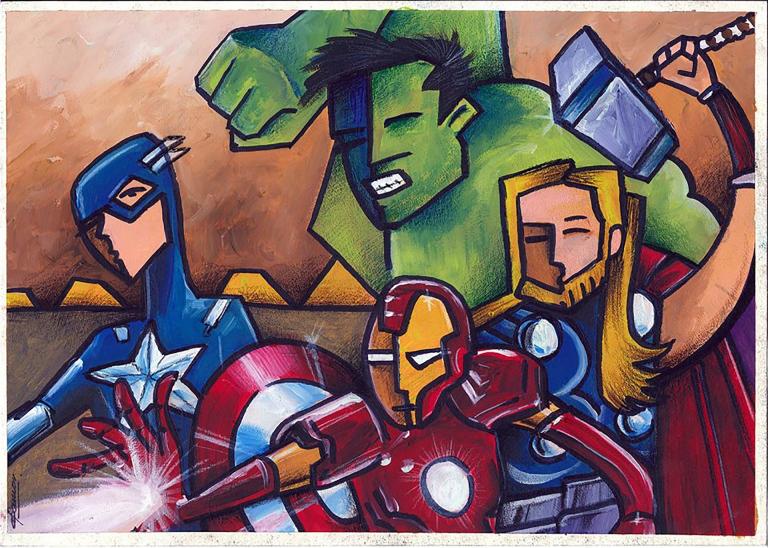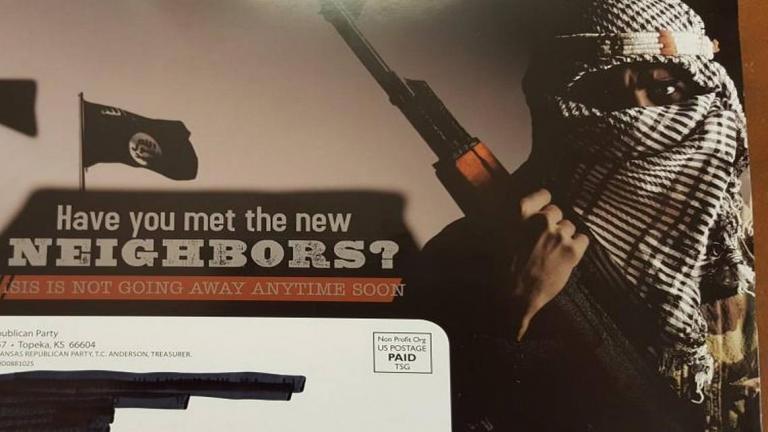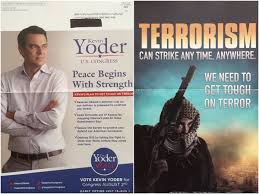This is the first sermon in a series, “Resist: Justice Heroes from the Bible and the Big Screen.” Text: Matthew 10:26-39
From superhero sagas to epic sci-fi adventures, our favorite fictional heroes aren’t just “super.” They are focused on larger issues. They lead the resistance against corrupt leaders and systems. They fight against the powers of darkness, working for justice and the greater good.
We may see movies as an escape; but deep down, we want to see this kind of resistance take shape in real time. Especially, in this current political climate, there seems to be a deep hunger for leaders who will help transform our communities in tangible and meaningful ways. When those leaders don’t appear in real time—well, we will take our $8 to the theater and seek them there.
Maybe that’s why the Avengers made for the biggest movie hit of the summer. This film was the culmination of 10 years of interwoven narrative; and it brought some of the biggest, most well-known comic book characters of all time together for one battle. Infinity War was the highest grossing opening weekend movie OF ALL TIME. Clearly, people had been waiting for this. The massive crowds gathered to see their favorite characters join forces, together in one place.
“And there came a day, (Goes the opening narration, which sounds a lot like ‘and it came to pass…’) And there came a day unlike any other … when Earth’s mightiest heroes found themselves united against a common threat … to fight the foes no single superhero could withstand … on that day, The Avengers were born.”
And that’s how it came to pass: that Thor and Iron Man, Black Widow and Star Lord, Dr. Strange and Spiderman, Captain America and the Hulk, Black Panther and Gomorrah, Rocket and Loki and company—all came together on one screen for one epic story that was really many stories converged.
What do all those characters have in common? For one thing, they’ve all got their own franchise and product line. For another, they’ve all got a complicated back story and their own personal flaws. But most importantly: each of these characters displays, not just superhuman powers but a notable measure of fearlessness.

Our scripture for today finds Jesus talking to the Disciples; just a few passages before this was the great commission; so this part of the story is the extended instruction manual for their life of evangelism. Among other things: he wants them to know what it might cost them.
He doesn’t mince words. It might not be pretty, he says. It could be dangerous. People aren’t going to like you everywhere you go. You’ll not be popular with the most powerful people, who tend not to like it when you say that their power is not absolute. But here’s the most important part of the instruction: don’t be afraid. He says it multiple times, that litany of “fear not” we hear repeated again and again throughout scripture. Those words often spoken by angels, sometime by God’s own self, when things are about to get epic.
Fear is a tricky thing. In a pinch, it can get us out of a life-or-death situation. If you’re being chased by a bear? That surge of adrenaline makes you run faster. It’s a wonder of evolution. But if we hang on to fear too long, we literally never move at all. It becomes our default position; and our body and our brain start to have a hard time distinguishing that bear from a person who just looks different than us.
September 11—that dark anniversary we observe again this week—makes us recall how the fear of that day was so palpable. Everything was chaos, and nobody knew what to believe or who to trust … people in New York and D.C. were literally running for their lives. That was understandable, in that moment. “Fight or flight” helps us survive disaster. Running is good.
But in the days after, people began to cling that fear as the new status quo. That fear of the unknown became fear of the other—fear of the Muslim, fear of the immigrant, fear of anyone with dark skin and a head covering.
Political opportunists amped up that fear. They leveraged it into very effective rhetoric that would solidify their own power, perpetuate misunderstanding, and further marginalize those whose looks or lineage made them stand out … Fear became, not a survival instinct, but a daily mode of operation.
In many ways, that fear is what moved us towards the current political climate that we struggle against today. We’ve all been inundated with ads for the upcoming election. Do you remember a certain mailer that came out, two years ago, from one of our local representatives? On the front, it featured an image of a shadowy, sinister-looking figure in full Jihad gear. And it said, in a font that looked like the title screen of a horror movie: “Have you met your new neighbor?” And the text on the other side outlined how this candidate would protect us from the “Muslim terrorists” that are trying to infiltrate our communities.


It was straight up propaganda, stoking up the post 9/11 fears of all things Islam. But that representative won. And he isn’t the only leader who’s in been propped up by their promises to protect us from that vague and villainous “other,” however fabricated those threats might be.
When people are already afraid, and need someone to be afraid OF, you can easily run entire campaigns on Build that wall!
The impulse to fear may be normal. But for disciples, our call is to resist—not just the powers that tell us to be afraid, but the impulse to fear itself … We are called to rise above basic fear and transform the reality of our narrative into some kind of new life.
For the Avengers, the embodiment of that fearful voice is an imposing villain called Thanos—like all of the characters, he’s got a compelling backstory that makes him … complicated. He’s got this misguided sense of benevolence, where he sees the planet’s resources depleting and thinks the only way to save life itself is to destroy half the population. Well, in polite circles we call that Genocide, and it’s not cool. In his own mind, his intentions may be good, but that desire to save life is warped by his own ego, and it becomes a death wish for all of life as we know it.
His philosophy amounts to trickle-down economics, at its finest.
And like all such economies, it is rooted in—and perpetuates—a fear of scarcity. And that fear makes him a monster. In taking on Thanos, in trying to keep him from acquiring enough power to destroy life as we know it, the Avengers aren’t just fighting a bad guy; they are fighting the force of fear itself, the baser impulse that drives all of human evil.
That’s exactly what Jesus calls the Disciples to do. He sends them out into the world’s economy of fear and scarcity; he arms them with good words, he tells them not to be afraid; he tells them they are bringing “Not peace but a sword.” I find this one of the most difficult passages in scripture, because we know Jesus to be a subversive force of radical nonviolence. And yet, he’s talking about weapons.
It’s because he knows that their message will be perceived as a weapon. He knows that powerful people will react violently to a gospel that seeks to uproot the world’s power structures. The message they bring will unsettle everything: from the economy to the government, to organized religion and the family system itself. And it’s not always popular to be the voice of resistance; the voice that says there’s enough room at the table, there’s enough room for the stranger and alien; the voice that says our greatest threat is the people who keep us small and afraid. He knows this good news will be deeply divisive in circles where people like to rely on their own strength. Their words, and their radical witness to God’s universal love, will subvert status quos, and make them terribly unpopular with powerful people.
And, as we all know—the real powers of darkness often take on human form.
Into that mission field, Jesus sends not one, not two, not five disciples; but 12. Not individuals but a body. A full force of power and witness. Because if you’re going to fight evil for real–the first thing you do is organize. The first thing you do is assemble.
In our own work for social change, the most effective organizers know this. They know how to assemble the powers of a community—in particular, a marginalized community—to advocate for itself. They know that once you’ve got enough people together working for a common cause, those individuals start to recognize their own power. And you can’t make them afraid.
There’s a group of kids here in our community called Students Demand Action. They’re part of a national movement of youth who are getting politically active, working for common sense gun reform in ways that (we) their elders have failed them. They’re mobilizing young people to get out the vote, they’re engaging their lawmakers, they’re taking the microphone in public spaces … and they are a force to be reckoned with. Our local chapter put on that candidate forum that we hosted last spring—the one that, with less than a week’s notice, brought about 600 people into our building? (I’m just saying, if the fire department had dropped by that day, we’d have been in trouble). That group is having their first meeting of the school year here at Saint Andrew this week! I hope that some of our own youth will get involved, and I’m grateful that we get to share our building with a group doing this good work in our community. I invite you to be in prayer for them as they gather here on Wednesday. And as they model for us what it might look like to get out of our comfort zones, and demonstrate for causes that matter: not just with phone calls and emails, but with a physical presence that knows no fear.
That’s what I want us to remember throughout this series: there many kinds of resistance. Watch for it. Learn from it. See where people are organizing; standing up for the vulnerable; or giving up something that hurts a little … even if it’s just a measure of their own comfort and safety.
But mostly: I want us to remember that not all heroes wear capes.
What really makes Avengers “super” is not their “super” powers, but their power over fear. Their willingness to step into a battle with no certain outcome. I follow a faith and film blog, and the author noted how grim the Avenger’s chances were in actually defeating Thanos: he put it at about 1 in 14,000,605. “But this is what heroes fight for,” he notes. “Not for certainty, but for possibility. A little thing called hope. This is why, despite the film ending with many of our heroes blowing away as dust in the wind, I found it to be incredibly life affirming.”
Real heroes get no promise of victory. They just pour their considerable strengths into hope. They resist—not just the evil of the world, but the evil of baser human impulses, and the darker power of fear itself.
You know, one other thing that all the Avengers had in common, apart from their fearlessness … was loneliness. They’ve all got these backstories of being misfits and outcasts, feared for what’s different about them, which is also what makes them each great. But in the epic saga that brings them all together, they are each transformed by the others.
This is the power of the gathered body, the many gifts and one spirit in which we are called to serve. Like the disciples themselves, real Avengers don’t go alone. First, always: they assemble.












